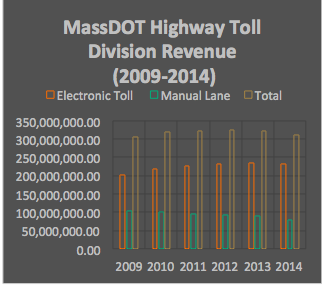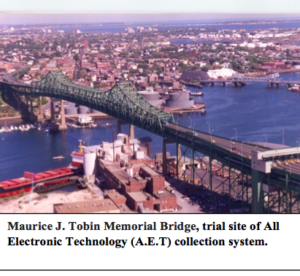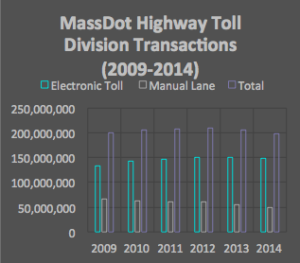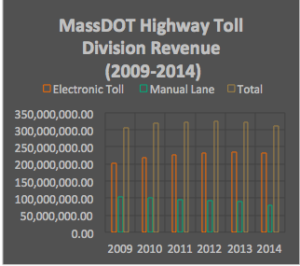Promising implications of MassDOT All Electronic Tolling, with a Catch
Efforts to convert all Massachusetts highways to an electronic tolling system are well underway. Awarded a $130 million contract from the state Department of Transportation (DOT), Raytheon Company hopes to replace all manual and existing toll collection systems by the summer of 2016, eliminating barrier tolls as well as the distinction between ticket- and trip-based tolling. Segments of drivers will instead be routinely charged along mainline highways.
All electronic tolling technology shows economic promise for the state. Recent adaptations to the program address the system’s initially inefficient billed fee collection process.
According to the transportation department’s most recent annual performance report, E-ZPass accounts for over 72% of all transactions taking place at MassDOT toll facilities. Increased electronic toll transactions from 2009 to 2014 correlate with higher annual revenue, demonstrating the profitability of all electronic tolling (A.E.T.) technology. Accompanying gradual increases in electronic transactions, total toll division revenue grew 2% between 2009 and 2012. Revenue decreased slightly from 2012 to 2014, as did the number of recorded electronic toll transactions. MassDOT anticipates that the completely cashless system will reduce operating expenses by $45 million per year.
(Data from http://www.massdot.state.ma.us/)
Issues with the pay-by-plate fee collection process were immediately realized after Tobin Bridge tolling went cashless. Under the fully automated system, vehicles lacking transponders are subject to image-based tolling. Cameras capture license plate information, later billing drivers $3.50 per pass. In the five months after the trial went live, Salem News reported that the state collected less than half of the $2.7 million pay-by-plate fees issued to motorists crossing the bridge. Motorists neglecting to pay received approximately $3.2 million in late fee charges, of which MassDOT only collected $600,000. An investigation by WBZ-TV’s I-Team of the system’s late-fee structure demonstrated how one woman’s 24 trips across the Tobin that should have cost $72 ballooned to $4,569.
Less than a year after the project’s start date, Transportation Secretary Stephanie Pollack announced a change to the system’s late-fee structure. If an invoice goes unpaid for 30 days, a $1 late-fee will be added to every unpaid pay-by-plate toll. An additional dollar is added to each toll transaction after 60 days of non-payment, and another dollar after 90 days. Unpaid Tobin Bridge toll transactions will be capped at $6. Drivers with outstanding fines may be barred from vehicle registration or license renewal until fees are settled. Reciprocity agreements with New Hampshire and Maine will not only track and prosecute drivers who have not paid toll fees, but also ensure that drivers with E-Z passes benefit from electronic tolling in neighboring jurisdictions.
Those driving the Pike on weekends will likely see reduced driving times, particularly at the dreaded I84 interchange. Time spent interacting with toll collectors contributes directly to traffic congestion. Compiled shortly before the kickoff of the electronic implementation system, figures reported by Toll Roads News indicate that drivers passing through tolls on weekends were around 10% less likely to use an E-Z pass. Predictably, out-of-state and occasional users account for a higher percentage of weekend drivers.
MassDOT’s all-electronic tolling system is a work-in-progress. Aside from economic implications and fee payment enforcement concerns, the system may reduce some traffic and the pollution that goes along with it. Additionally, greenhouse gases associated with rapid vehicle breaking will be somewhat mitigated. Raytheon C41 system vice president Bob Delorge assures that the new program will allow for “faster toll booth transactions and fewer lane closures”.
There is, however, a likely catch to this promise: while weekend congestion will be reduced, long bemoaned rush-hour traffic will likely persist. Daily turnpike commuters will still experience holdups because of the high volume of vehicles and bottlenecks due to outdated, undersized roadways. Still, the transition seems to be a promising and positive move for MassDOT. “This new structure is the result of a thorough review that incorporated a substantial amount of public feedback into the final product,” MassDOT Highway Administrator Thomas J. Tinlin stated. It’s a hopeful sign that this will be an adaptable, transparent system.
Christina Doran is a Transparency Intern at Pioneer Institute from the University of Richmond, majoring in English and Economics.






